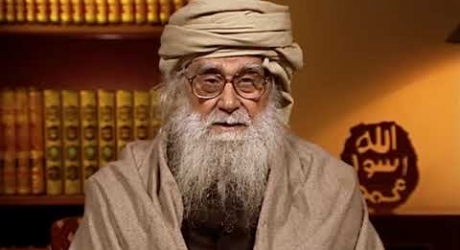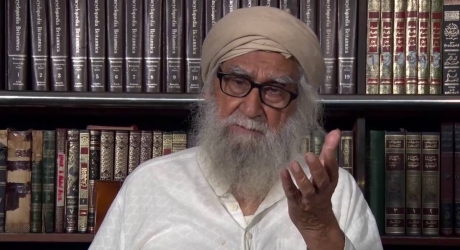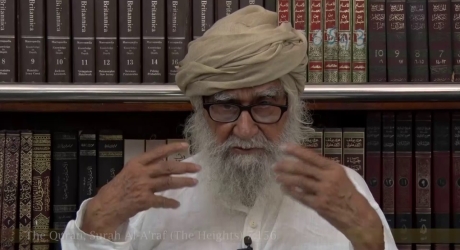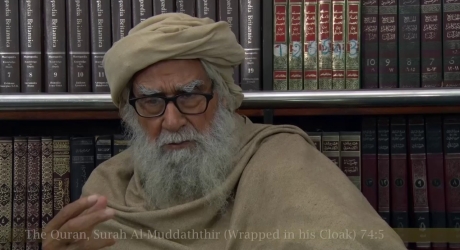Hadith, meaning a “statement” or “report”, is used as an Islamic term for the records kept of the sayings and doings of the Prophet Muhammad. Sunnah means the actions the Prophet himself performed, or actions he asked his followers to perform. The Hadith is a record of the Sunnah. Hadith, meaning a “statement” or “report”, is used as an Islamic term for the records kept of the sayings and doings of the Prophet Muhammad. Sunnah means the actions the Prophet himself performed, or actions he asked his followers to perform. The Hadith is a record of the Sunnah. Hadith provides the second fundamental source of Islam, giving us a full account of the life of the Prophet, and serving as a commentary on the Quran. The Quran principally deals with basics. It is the Hadith which gives the details and necessary explanations of Quranic injunctions. For instance, the Quran says: “Establish the service of worship.” But it does not specify how the worship has to be performed. Not even the timings and units of prayers (rak‘ahs) are clearly mentioned. We need the traditions set forth in the Hadith to have full information on this. Even after knowing the details, it might still not have been possible to follow the divine injunctions contained in the Quran. For not everything can be properly understood by words alone. Therefore, the Prophet demonstrated to the faithful how prayer was to be performed. He said to the believers: “Look at me, see how I worship, and follow me.” The Quran repeatedly reminds us of the importance of Hadith, enjoining us to strictly follow the Prophet: “..Obey God and obey the messenger...” (Al-Nisa, 4:59). It is as if the Quran is the text and the Hadith the commentary, the Quran being the theory and the Hadith the practice. The Quran and Hadith are complementary to one another and are thus inseparable. Both are equally essential for the establishment of religion.
Introduction
Hadith meaning a ‘statement’ or ‘report’ is used to refer to the records kept of the words, deeds and sanctions of the Prophet Muhammad. The necessity of the hadith arose as it gives a full account of the life of the Prophet, and serves as the commentary to the Quran. The Islamic jurisprudence or law (called Fiqh) considers hadith to be the second fundamental source, next only to the Quran. The Quran thus provides the fundamentals of religion. It is the hadith, which furnishes us with the necessary details and explanations. It is as if the Quran was the text and the hadith its commentary: the Quran being the theory and the hadith being the practice. Thus the Quran and hadith cannot be separated from one another. They are complementary to each other. Both are equally essential for the establishment of religion.
Constituents of Hadith
The early writers on the subject of the hadith evolved certain rules to classify the hadith. According to the traditionists, Hadith may constitute any or all of the following three: Qaul (Speech), Amal (Actions) and Taqrir (Silent Consent). Indicating the importance of perusal of Hadith, an Islamic scholar said that a speaking-Prophet dwells in the house which has a collection of the Hadith.
It can be rephrased to mean that Hadith is the continuation of Prophethood. On the one hand, the Word of God exists as an authentic text in the form of Quran and on the other hand, Hadith is an authentic model. This arrangement was so prescribed because even after knowing the details, it may not be possible to follow the divine injunctions contained in the Quran, for not everything can be properly understood by words alone. Therefore God’s Prophet demonstrated before the faithful how the practice of worship was to be performed.
Arduous and painstaking efforts of the Prophet’s companions and their successors led to the compilation of Hadith. Some of these are Al-Bukhari (7,563 Hadith), Musnad Imam Ahmad (30,000 Hadith), Mishkat (6,585 Hadith). This task became possible after many devoted their entire lives to collecting traditions from different centres of learning, with the result that a large number of traditions were preserved.
Traditions of the Prophet
Dawah Work
According to a tradition, Prophet Muhammad said
Doomsday and I have been sent in such proximity as man’s two fingers (Al-Bukhari)
Last in the long line of prophets, Prophet Muhammad, is known as the ‘seal of the Prophet’. In other words, after Prophet Muhammad, no other Prophet will be sent by God; only doomsday shall come to pass. This means that man needs to become wary on two accounts – one that he strives to rectify his mistakes so that he is saved from the abasement of the Day of Judgment and second that he involves himself in doing dawah work and spreading the message of God to mankind.
Doing dawah work is obligatory upon the believers of the Prophet Muhammad. The Quran refers to him as the “warner” and after him, this responsibility has to be discharged by his followers. According to a verse in the Quran
“O Prophet, We have sent forth you as a witness, as a bearer of good news and a warner.” (33:45)
It is to say that all believers must become warners and followers from this very moment because there is no better time to start than this very minute.
God-Realisation (Marefat)
According to a tradition of Prophet Muhammad,
He who said, ‘there is no God but One God’ will enter Paradise (Al-Bukhari)
This is not a simple utterance but an expression of God-realization. When man discovers God at a level such that his personality undergoes a revolution, he is overwhelmed by a sense of nothingness. Acknowledging the attributes of God, man admits that there is no God but One God and this acknowledgement and sincere outpouring of gratitude makes him worthy of a place in God’s paradise.
Importance of Intention
According to a tradition of the Prophet
Actions depend upon intention (Al-Bukhari)
The above implies that spirit, not form makes the essence of man’s deeds and shall be the deciding factor on the Day of Judgment when man shall be held accountable for all that he did in the present world.
Charity
According to a verse in the Quran
And those who give to others what has been bestowed upon them with their hearts trembling at the thought that they must return to their Lord (23:60)
Charity is an act of expressing one’s nothingness before God. It must lead one to realize that very soon such time shall arrive when the apparent differences between the poor and the rich will vanish and each man shall stand accountable before God.
Mission of a believer
Any mission demands right intention and resolve to reach culmination. Highlighting the importance of intention in an action, a tradition quotes Prophet Muhammad as having said
If you migrate for worldly benefit, you shall receive its benefit. If you migrate for religion, you shall receive its benefit. (Al-Bukhari)
This tradition brings to fore two perspectives about the life of a man on mission. First choice is that he may become, “One man, one mission”. Such a life demands that he gives up the concern for earning his livelihood and leaves it upon God to sustain him. This was the way of the Companions of the Prophet. Be it the lack of awareness of the language of the new lands or the hardships that lay in traversing the long and unassailable terrains, nothing deterred these men from reaching far and wide to spread the word of God.
The other option is to become, ‘One man, two missions’. Life of such a person is spent pursuing two causes – earning a livelihood and doing dawah work alongside.
Five Pillars of Islam
In order that he may lead his life properly in this world, Quran (the word of God) and Hadith (the words and actions of the Prophet Muhammad) provide man with an action plan known as the ‘Five Pillars of Islam.’ These are Iman (faith), Salat (prayers), Zakah (almsgiving), Hajj (pilgrimage to Makkah) and Sawm (fasting). (Al-Bukhari)
Just as a house stands on pillars, so does the Islamic faith stand on these five tenets. These pillars are not mere rituals, but if performed with the true spirit, they become the source of receiving the choicest divine blessings.
Iman (Faith)
The literal meaning of Iman is to believe in or to have faith in something. This deep faith is attainable through realization alone. One is required not only to testify to one’s faith, in the oneness of God and the prophethood of Muhammad by word of mouth (Shahadah bil Lisan), but also to accept it with all his heart and soul.
Salat (Prayer)
Salat means prayer. It forms the most important part of Islamic worship. Salat is intended to inculcate a deep sense of submission in a believer. The spirit of prayer is humility. One who bows before his Creator, in the true spirit will be devoid of pride and ego. The actions of prayer are a manifestation of the fact that one’s heart is full of fear and love for God. Therefore, if prayers are said in their true spirit, one’s prayer will surely fend off indecency and evil by purifying the worshipper’s soul and serve to bring him closer to God.
Zakah (alms-giving)
Zakah means purity. This means that a man purifies his earnings by giving away one part of them in the path of God. In this way, zakah awakens the sense in man not to consider his earnings as his own possession, but a gift of God. Zakah is, in essence, a practical acknowledgement of God’s bounties. It therefore serves to remind man that in his earnings, more than ninety nine percent share is of God because without His life support system, man would not have been capable of doing anything. It is this admission of the beneficence of God, which is no doubt the greatest form of worship.
Hajj (Pilgrimage)
The root meaning of the word, “Hajj” is to set out or to make a pilgrimage. Hajj is a symbol of global unity of believers. It is also through Hajj that Muslims from all over the world are reminded of the sacrifice of Prophet Abraham and the historical places associated with the Prophet Muhammad. In this way they return with a long-lasting inspiration, which continues to activate them to adhere to the path of God throughout their lives.
In one Hadith, the Prophet called it “the supreme act of worship.” But it is not just the rites of pilgrimage that constitute this importance; it is the spirit in which Hajj is performed. Hajj has been prescribed so that it may inspire us with a new religious fervour with one’s faith in God strengthened and rekindled – that is the hallmark of a true pilgrim.
Sawm (Fasting)
The Arabic term for fasting is, ‘Sawm’ which means to abstain. It is a form of worship, which has to be observed annually, in the month of Ramadan. The outward form of sawm is abstinence from eating and drinking from morning till sunset. The inner state of sawm is renunciation of all things that God has forbidden, directly or indirectly. It aims at weakening the material aspect of man and strengthening the spirituality in him. When a man fasts, observing all these aspects of fasting then he comes to experience closeness with God and it becomes a training regime for him to lead a disciplined life for the sake of God.
On Unity
According to a tradition, Prophet Muhammad used to wake up before Fajr (dawn break) and pray
O God, I bear witness that all mankind is a brotherhood (Abu Dawud)
This prayer arose out of the deep spirit of unity, which he felt connected all men and women. Such a spirit ensures that when a person enters in the society, he bears in his conscious mind that the entire mankind is a family in the extended sense.
On being a problem-free person in society
Good character is the sum of personal virtues, which guarantees correct and agreeable behaviour in daily social interaction. A person of good character will invariably conform in his behaviour to a strict code of ethics. What should be the underlying principle of this code of ethics? According to a hadith it is simply this—you should like for others what you like for yourself, that is, you should treat others just as you want to be treated by others. According to a tradition, Prophet Muhammad said
It is illegitimate for a believer to harm any of the following during his conduct with other men – his being, his money, his character (Mishkat)
This tradition clearly pronounces that any form of monetary embezzlement or infliction of physical harm on a fellow human-being is clearly unIslamic. According to another tradition, Prophet Muhammad said
By God he is not a believer (3), he who creates problems for his neighbours (Mishkat)
The above means that a true believer is one who lives amidst others as a no-problem person. He should not become the source of trouble-making for others or else his very faith shall be at stake before God. According to a tradition, Prophet Muhammad said
If you cannot give anything to anybody, do not create problem for them (Musnad Ahmad)
This means that either you should be a giver member of the society or live as a no-problem person; a third option does not exist.
According to a tradition, Prophet Muhammad said
A believer is one, from whose hands and tongue, people are safe (Musnad Ahmad)
He who does not keep his word is bereft of faith (Al-Baihaqi)
It means that man must live in the society very carefully, cognizant of his conduct at all times. Consciously or unconsciously, man’s actions must not harm anyone because he shall be taken to task even for misdeeds committed unintentionally. In other words, it means that man’s unawareness of his actions will not serve as an alibi before God. Hence he must think a lot and consider the result before acting.
Such a considered behaviour would not have been demanded had man been living alone on an island but since he is a part of a society, such accountability inevitably follows. An alim is recorded to have said that strength of faith is dependent upon your dealing with other men. It means that the dealing of a person with others will be a yardstick to judge the faith of that person.
According to a tradition, a man praised another man before Caliph Umar. Umar asked if he had ever dealt with this man. When his listener said no, Umar replied that in that case the man being praised must have only been seen getting up and sitting down in the mosque. This tradition alludes that a person can be considered as worthy of praise only when he is transparent in his dealing with his fellow men. This is what inculcates taqwa.
Taqwa
According to a tradition, Caliph Umar asked someone about the meaning of taqwa. The man asked the Caliph if he had ever crossed a path having thorny bushes on both sides. Umar said ‘yes’. The companion asked him what he did? Umar said that he held his clothes tightly and cautiously passed from there. The companion said that is taqwa. It means that the world will not be bereft of unpleasant situations. Unpleasantness will happen again and again. At such times, if man reacts, it is unislamic behaviour. A true believer is one who stays positive despite negative situations, does not react in unpleasant circumstances.
The Quran says
Paradise is for mutaqqis. (3:133)
The world has thorny bushes but to live without reaction is the gist of taqwa and Islamic living.
The Quran says
When they (believers) are angry, they forgive (42:37)
A man came to Prophet and asked for a comprehensive advice. Prophet said, ‘Do not become angry’ (Musnad Ahmad) This means that man must not react under any circumstance even when provoked, because that is the root cause of all evil.
Every day in our life, we perhaps have some kind of bad experience, big or small. There is no escape from experiences. One has two options: either to ignore them or try to react. The first option is a form of forgiveness, while the other amounts to engagement and in some cases, even revenge.
Which is the better option? We have to decide by looking at the result, for that is the determining factor.
Forgiveness is a better option for it is based on a proven formula: ‘Save yourself’. Forgiveness saves you from distraction, it saves your time, and it saves you from creating more problems. Forgiveness could amount to an instant solution to the problem.
In contrast, reaction and emotional revenge means turning the bad into worse, for revenge tends to worsen the problem. If forgiveness is buying time, revenge is just wasting time without hope of any positive result.
Prophet Muhammad is therefore the role model for believers. This is because any ideology seeks a role model who provides the practical manifestation of the guiding principles of life. The book per se cannot be a role model, this purpose can only be fulfilled by a man. The Prophets and the Companions of Prophet Muhammad are such role models for believers, adherence on whose path shall lead them to eternal success!











